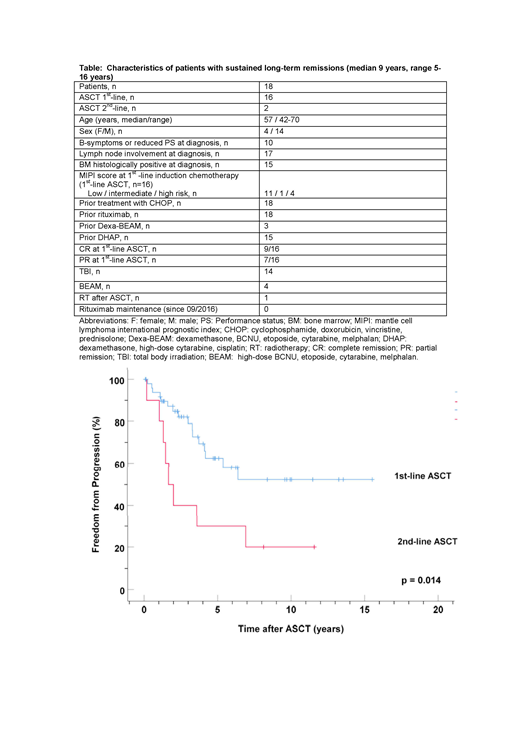Background:Long-term clinical and molecular remissions in patients with MCL following HDT and ASCT have been evaluated in only a few studies. Results are especially limited for remission duration over 5 years. So the curability of this disease remains an open question. Patients and methods:Altogether 61 patients with MCL were treated in our institution with ASCT from 1998 to April 2019 (50 1st-line ASCT, ten 2nd-line ASCT, one 3rd-line ASCT). The data were collected retrospectively in 29 and prospectively in 32 patients who participated in two clinical trials: the 1st-line therapy trials of the German Low Grade Lymphoma Study Group (GLSG, principal investigator W. Hiddemann [Dreyling M, Blood 2005] and the European Mantle Cell Lymphoma Network [Hermine O, Lancet 2016], respectively. The diagnosis was regularly approved by the reference pathology of the GLSG (W.K.). The induction therapy before 1st-line ASCT consisted of 6 courses CHOP (n=11), mostly combined with rituximab and followed by Dexa-BEAM, and 6 alternating courses of R-CHOP and R-DHAP (n=39), respectively. For the salvage treatment patients usually received three to four courses of the DHAP protocol or the ESHAP protocol, since 2001 also combined with rituximab.Stem cell apheresis was carried out in the Blood Transfusion Service following these protocols in remission. High-dose protocols: 1) total body irradiation with cyclophosphamide or melphalan and cytarabin (n=32) or 2) BEAM (n=29). Patients with partial remission after ASCT received a radiotherapy (RT) with 30-36 Gy in the field of persisting lymphoma, if possible (n=4). Since 09/2016 patients received a maintenance therapy with rituximab after ASCT (every 2 months, planned for 3 years, n=14). Further details are described in an earlier publication of our first 36 patients (Metzner B, Ann Hematol 2013). Response assessment was performed by careful clinical examination and by ultrasound, chest x-ray and partly CT at regular 3 - 12 monthly time points. In the case of long-term remission (≥ 5 years; n = 18), peripheral blood was regularly tested twice a year for minimal residual disease (MRD) by quantitative t(11;14) or allel specific IGH RQ-PCR and/or IGH-consensus PCR.Calculations were done using IBM SPSS Statistics Version 25. Data were analysed as of 01 July 2019. Results:With a median follow-up of 5 years (range 0.1-20) 10-year overall survival, progression-free survival (PFS) and freedom from progression (FFP) after 1st-line ASCT were 54%, 46% and 52%, respectively, after 2nd-line ASCT 42%, 20%and 20%, with a significant difference for PFS (p=0.045) and FFP (p=0.014) between 1st-line and 2nd-line cohort.Further prognostic factors (like sex, age, MIPI, bone marrow involvement, remission grade at ASCT: CR vs. PR, type of HDT: TBI vs. BEAM…) seemed to be without relevance (considering the small subgroups). Only one clinical relapse occurred after 5 years following ASCT in 1stor 2ndremission, respectively (one patient 6 years after 1st-line ASCT and another patient 7 years after 2nd-line ASCT and subsequent radiotherapy). So far, 18 patients experienced long-term remissions of at least 5 years (median 9 years, from 5 to 16 years). Fifteen of 17 tested patients were MRD negative at last follow-up, the two MRD positive patients (positive at a low level below the quantitative measuring range) had no clinical signs of relapse at last follow-up. None of these 18 patients had received rituximab maintenance therapy. None showed clinical criteria of "smoldering mantle cell lymphoma" at induction therapy. Treatment-related mortality at 100 days after ASCT was 1.6% (pneumonitis following TBI). One patient developed a secondary invasive malignancy in remission after ASCT (acute myeloid leukemia 4 years following TBI). Conclusion: Sustained long-term clinical and molecular remissions up to 16 years can be achieved following ASCT (without rituximab maintenance therapy), indicating the potential curative impact of 1st-line ASCT in MCL. The 2nd-line ASCT was obviously less effective.
Dreyling:Celgene: Consultancy, Other: scientific advisory board, Research Funding, Speakers Bureau; Janssen: Consultancy, Other: scientific advisory board, Research Funding, Speakers Bureau; Mundipharma: Consultancy, Research Funding; Roche: Consultancy, Honoraria, Membership on an entity's Board of Directors or advisory committees, Other: scientific advisory board, Research Funding, Speakers Bureau; Bayer: Consultancy, Other: scientific advisory board, Speakers Bureau; Gilead: Consultancy, Other: scientific advisory board, Speakers Bureau; Acerta: Other: scientific advisory board; Novartis: Other: scientific advisory board; Sandoz: Other: scientific advisory board. Klapper:Roche, Takeda, Amgen, Regeneron: Honoraria, Research Funding.
Author notes
Asterisk with author names denotes non-ASH members.


This feature is available to Subscribers Only
Sign In or Create an Account Close Modal